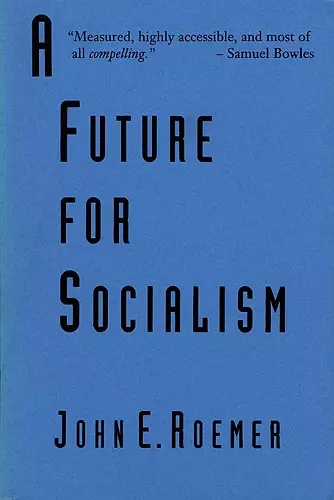A Future for Socialism
Format:Paperback
Publisher:Harvard University Press
Published:31st Jan '94
Currently unavailable, and unfortunately no date known when it will be back

Many people point to recent events—the collapse of the Soviet Union, the electoral defeat of the Sandinistas—as proof that capitalism has triumphed over socialism once and for all. In A Future for Socialism, a noted economist argues that socialism is not dead but merely in need of modernizing. John Roemer believes that the hallmark of socialism is egalitarianism—equality of opportunity for self-realization and welfare, for political influence, and for social status—and he reminds us that capitalist societies face increasingly difficult problems of poverty and social inequality. Reenergizing a debate that began with Oskar Lange and Friedrich Hayek in the late 1930s, he brings to important questions of political economy a new level of sophistication in line with contemporary theories of justice and equality.
Roemer sees the solution of the principal-agent problem as the key to developing a decentralized market-socialist economy. This would be capable of maintaining efficiency and technological innovation while supporting a substantively more equal distribution of income than is achieved in capitalist economies. Roemer defends his views against skeptics on the right, who believe that efficiency and innovation are incompatible with egalitarianism, and skeptics on the left, who believe that socialism is incompatible with markets.
Because of its interdisciplinary approach, A Future for Socialism will appeal to a general social science audience, including economists, political scientists, sociologists, and political philosophers. It is also accessible to the interested reader.
Roemer says it’s always been assumed that markets only worked with private ownership. His book, A Future for Socialism, challenged that. Writing after the collapse of socialism in Eastern Europe, he wanted to see whether he could formulate an alternative to unbridled capitalism—so he combined a free market and centralized control. ‘Firms would be neither private nor public,’ he says. Instead the nature of ownership would alter so that every citizen was, in some way, a shareholder… This may seem unusual, he says, but it’s not unknown: ‘Alaska has it for the oil fields that are owned by the state. Every citizen of Alaska gets a royalty cheque each year… It’s your right while you are a citizen of Alaska.’ In his socialist state, companies would compete with each other, and workers would be able to move from job to job. There could even be incentives for managers (larger salaries, bonuses, other perks), Prof. Roemer believes, ‘assuming that’s what the labour market would pay them.’ -- Ian Coutts * Globe and Mail *
Roemer is perhaps the most interesting reexpositor of Karl Marx around. * Boston Globe *
[Roemer] has important, innovative, powerfully argued ideas for sweeping political and economic reform. -- Stephen Howe * New Statesman & Society *
Roemer offers an innovative and controversial definition of socialism… As an intervention in the public debate about what economic system we should collectively aspire toward, A Future for Socialism succeeds brilliantly. A focus on the main issues, theoretical imagination, distillation of complex ideas to an accessible core, plus clarity and parsimony of expression are its key strengths. Reading this book will surely bolster the confidence of socialists and might even spur foes of socialism to seek the most humane possibilities available under the capitalist economic system. -- Tom Mayer * American Political Science Review *
The Left is in vital need of bold and creative new thinking on the question of the institutional conditions for radical egalitarian alternatives to capitalism… John Roemer, an eminent, left-wing mathematical economist, has produced an extremely interesting and innovative example of this kind of thinking in his book A Future for Socialism. In it Roemer elaborates a model for how institutions could be designed so as to make market socialism a sustainable—and desirable—way of organizing an economy… At the core of the analysis is a deeply sociological idea: Property relations shape the distribution of resources and power in ways that bear systematically on the normative consequences of actors’ strategies. Roemer is one of the most original thinkers working on these kinds of questions. Sociologists interested in broad questions of social justice, equality, and large-scale social change will be well served to study this work carefully. -- Erik Olin Wright * Contemporary Sociology *
[A] timely and important effort to rekindle the fundamental debate over the possibility and desirability of socialist economic organization that has been so fruitful a source of economic theories and insights in the 20th century. Roemer writes with a sophisticated understanding of subtle economic points and an enviably lucid and concise style. This book would be an excellent supplement to undergraduate economic theory courses, reviewing a wide range of basic political economic concepts such as efficiency in allocation, principal-agent conflicts, theories of income distribution and technological innovation, and models of the political process, in the context of a concrete and compelling discussion of an important political–economic issue. Roemer puts forward a market-oriented model of socialism in which a private-enterprise sector of small privately held firms co-exists with a market-socialist sector of large publicly held and financed firms… One does not need to agree with Roemer’s estimate of the relative merits of capitalism and socialism to find food for thought and discussion in his critical analysis of the fundamental economic issues involved. -- Duncan K. Foley * Journal of Economic Literature *
Measured, highly accessible, and most of all compelling. -- Samuel Bowles
Essential reading for those interested in rethinking the foundations of the socialist project and for those with a more academic interest in the relationship between forms of property relations and economic institutions. -- Eric Olin Wright, University of Wisconsin
John Roemer argues that socialism is about equality, that a democratic market socialism represents the best hope for achieving equality, and that the failure of the Soviet-style planned economies does not defeat that hope. -- Joshua Cohen, Massachusetts Institute of Technology
ISBN: 9780674339460
Dimensions: unknown
Weight: 209g
184 pages